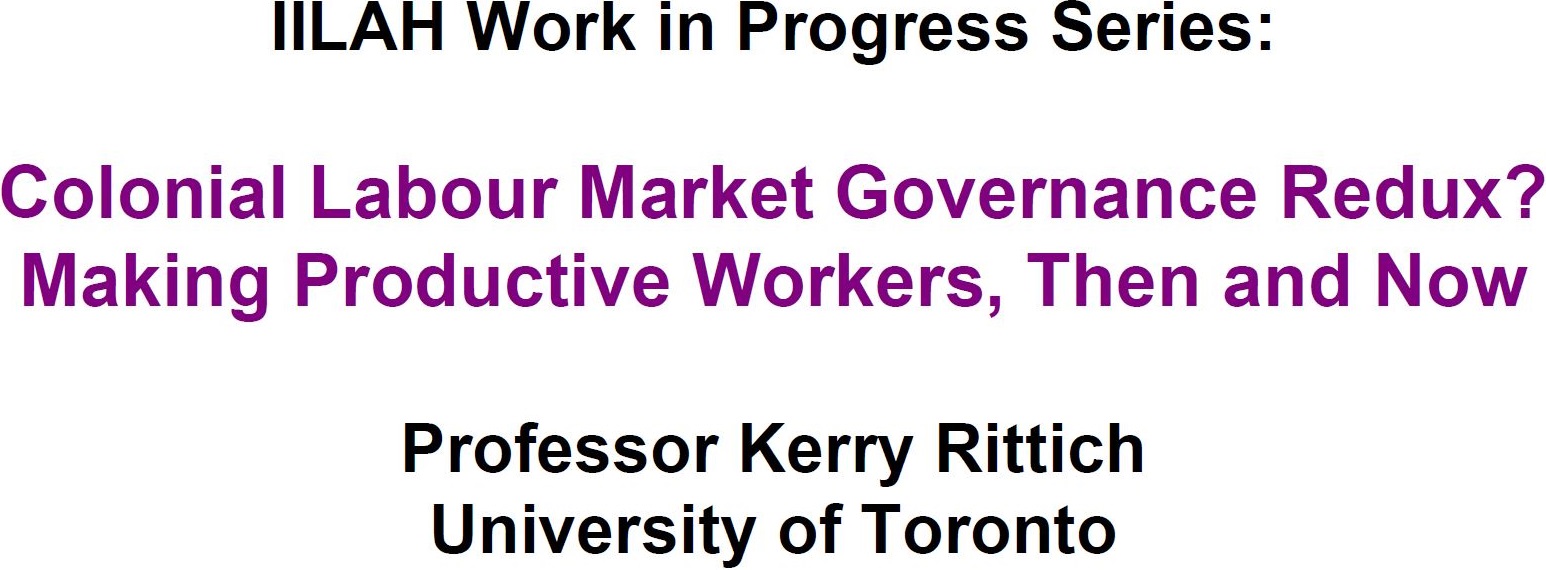
Thursday 9 May 2019 | Melbourne Law School | Room 920
1:00 pm - 2:00 pm | 185 Pelham Street, Carlton VIC 3053
with an extended discussion until 2.30 pm
Labour law scholars and activists alike now confront myriad work-related phenomena that the field is ill-equipped to manage, or in some cases, even to conceptualize. Informal work, long marginal to labour law but central to work in the Global South, poses challenges that go to the core of the discipline. At the same time, development institutions and technocrats are actively seeking to formalize work in furtherance of productivity and welfare gains and, in the process, generating fundamental questions about the nature, aims and effects of workplace regulation.
Drawing on scholarly practices within fields such as public international law, this paper pursues two linked intuitions: first, that labour market governance is indebted to its colonial predecessors in as-yet unexplored ways; second, that refracting current projects to formalize work through the lens of colonial governance practices may illuminate some of the key, continuing normative debates and institutional challenges around the regulation of work. Examining the representation of informality as a deficit to be remedied in both labour law and development, it investigates the legal and policy mechanisms used by British colonial administrators to (try to) make workers more productive; the shifting ideologies that informed these efforts; and the ensuing limits and consequences, social as well as economic, as the administrators perceived them.
Colonial administrators were preoccupied with the task of securing an adequate labour force for Western enterprise; habituating workers to the norms and demands of wage earning in fickle markets; and disciplining unruly labour markets and work practices through law. They experimented with a wide range of contractual devices and policy interventions to advance these ends, from reforms to debtor and creditor and land law to tax and education policy. They also reflected at some length on issues that remain central to contemporary debates surrounding work.
One, explored by Lugard in his Dual Mandate in British Tropical Africa, is the vexed relationship between freedom for workers and wage labour for development. Another, explored by Furnivall in his Colonial Policy and Practice, concerns the effects of market institutions on social norms and institutions and the distribution of economic benefits as between natives and foreigners that ensues from their implementation. Their analyses thus shed light on questions central to both labour and development: how are economic and social progress continuously represented as coterminous, despite long experience of the ways in which they diverge as well as converge? What forms of coercion are workers compelled to accept in ‘free’ markets for labour? How much do contemporary regimes of production mirror colonial regimes in respect of the balance of benefit and harm, for example between North and South, labour and capital, and to what extent do particular populations remain at risk?
About the presenter
Kerry Rittich is Professor of Law, Women and Gender Studies, and Public Policy and Governance at the University of Toronto. She writes in the areas of labour law, global governance, law and development, and gender and critical legal theory.
Among her publications are “Black Sites: Locating the Family and Family Law in Development” (American Journal of Comparative Law, 2010); (with Guy Mundlak) “The challenge to comparative labor law in a globalized era”, M. Finkin and G. Mundlak, eds., Comparative Labor Law (Elgar, 2015); and “Theorizing International Law and Development”, F. Hoffman and A. Orford, eds., Oxford Handbook of the Theory of International Law (OUP, 2016). The full list of her publications is available here.
A former Associate Dean at the Faculty of Law, she is a Senior Faculty member at the Harvard Institute of Global Law and Policy and has been a fellow at the European University Institute, the Mackenzie King Visiting Professor of Canadian Studies at Harvard University, Visiting Professor at the Watson Institute for International Studies at Brown University and Sciences Po Law School in Paris, and Professor and Academic Director of the Center for Transnational Legal Studies, London.